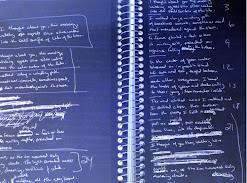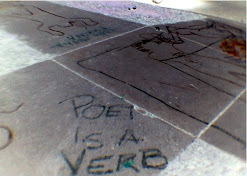Today, I was lucky to participate in a collage workshop at my alma mater. The event was sponsored by West Egg Literati, a student organization that produces an awesome journal and it was lead by my former advisor, Deborah Keenan. While Deborah considers herself a poet first, she is also a pretty accomplished collage artist and each year she runs this workshop.
It was great because it was a no pressure, creative event, like most workshops run by Deborah. All we had to bring was 30 words of writing, 3 backings, and scissors and a glue stick.She gave us a little intro where she discussed her approach to collaging, what works for her. Her approach is interesting because she collects mountains of collage material throughout the year and then when she goes on vacation, she works on her collages. She works with both words and imagery and tries to integrate both into the finished product, although they don't always end up combined into one piece.
After reading some poems, she sent us off into our corners. Once we got to work, we got to pick through her scrap reserves, which had a great combination of modern and older stuff. I found myself drawn to mostly black and white images, and religious iconography (for some reason), and I spent most of my time on the first one. It was very much a fluid, instinctive experience, although I don't know how I feel about the finished product...or what it says. When she gave us the fifteen minute bell, I realized I hadn't used much of my haiku that I brought, so I put together the more spartan second piece. I like it because it has more texture, although again, I don't know if it's done.
Finished or not finished, quality or crap, I enjoyed the process of cutting and trimming and gluing together these pieces, and I think that I want to spend more time collaging.
So, my question for you collagers out there, especially those with limited work spaces: how do you organize your scraps? I normally go through my magazines on the day that I collage, but I find that it creates kind of homogeneous pieces. I want to collect, but I'm limited on room. Any advice on organization would be appreciated!
Sunday, November 4, 2007
Scavenging
Posted by Jessica at 5:20 PM 5 comments
Labels: art and writing, collage, heroes, Inspiration, NaBloPoMo, Writing Organizations, Writing Relationships
Friday, November 2, 2007
Everyday Poetry is Poetry Every Day
I realized on the bus yesterday that there has been a shift in my writing over the past year or so. I’ve begun to write “everyday” poems. By everyday poems, I mean that they are inspired by my daily life and they recognize the poetic in that life. This is a huge change for me.
When I was in college and grad school, a poem had to have meaning. It had to have a political rhetoric or a deep significance to my childhood or my Identity As A Woman, or some such. Now, I believe that type of writing still has its place, but quiet frankly, I’ve exhausted that route. There’s only so much I can write about those heavy topics. So instead, I’ve transitioned to writing about my domestic, work, and interior lives.
Part of this has definitely been inspired by the quantity of writing I’ve been doing. I’ve been lucky enough to be inspired by several good prompt sites, including the dearly departed Poetry Thursday, Writers Island, Totally Optional Prompts and the soon-to-be fabulous read. write. poem. With these three current sites, I have three opportunities to write poems per week. And those poems can be inspired by something as simple as what I experience every day.
In grad school, one of my teachers called these “out the window” poems. She said this while talking about Cornelius Eady’s first book. There are a lot of political heavy poems about race in this book, but then there are just poems where he looks out the window and records what he sees. I didn’t understand the significance of this type of writing until now. I gravitated towards heavy political poems because they were Important. It seemed almost too mundane, just to write about what happened in my real life. But that’s all the fodder I have now, and I like where it’s taking my poetry.
Maybe it’s the Donald Revell talking, but I think that poetry may be about the act of noticing, rather than the idea I’m trying to convey.
Posted by Jessica at 8:10 PM 3 comments
Labels: Inspiration, NaBloPoMo, writing habit, Writing Organizations
Saturday, October 13, 2007
Local Book Love
There are so many reasons why I love living in Minneapolis, but one that sticks out this weekend is the Twin Cities Book Festival. My city is incredibly literate -- we are often ranked in the top two in the Top Literature Cities in the US. (Stupid Seattle dethroning us this year.) We are also host to several notable independent presses and noteworthy journals. All of those organizations, plus many local writers and book artists converge upon Minneapolis Community and Technical College to showcase their wares this weekend. My husband and I walked down this morning and had an awesome time.
My three highlights were the books I got, of course.
I met Kirsten Dierking, the author of One Red Eye, which I loved when I read it earlier this year. I bought her new book, Northern Oracle, and got it signed. She was totally gracious and chatted with me for a moment while signing it, because we went to the same grad school.
I also bought The Art of Attention: The Poet's Eye, by Donald Revell, because it looked really good. It's part of a series, edited by local author Charles Baxter, by "important writers on the craft of writing." (Quote from the back of the book) The other one that has been produced so far is The Art of Subtext by Baxter.
The last book was a freebie from MNArtists, an organization I belong to, called What Light. It's an anthology of Minnesota Poets.
I also collected a lot of promotional material from a bunch of cool organizations, presses, and journals. So here's me passing along the info, to help support my awesome local literary scene. I've gotta keep the publication karma positive, if you know what I mean.
Organizations
Professional Editors Network
Laurel Poetry Collective
Minnesota Center for Book Arts
Minnesota Literacy Council
Minnesota Literature
Journals
Midway Journal
Minneapolis Observer Quarterly
Dislocate
Water~Stone
Independent Presses
Blueroad Press
Red Dragonfly Press
Coffee House Press
Spout Press
Scarletta Press
If you are a budding writer who lives in Minneapolis metro area, I would strongly encourage you to visit the book fair this weekend. It's a great networking opportunity and a good resource for local publication venues.
Posted by Jessica at 12:58 PM 1 comments
Labels: bibliophilia, famous writers, Writing Organizations, Writing Relationships
Friday, June 29, 2007
Dana Gioia Done Good
A friend of mine sent me this article from CNN.com about a new NEA program. Dana Gioia, the second term chair of the government agency, has created a new program called "The Big Read." In over 400 cities across the country, the NEA is providing grants for spreading specific works of literature. Click here to see what book is being used in your community.
By getting a community to focus on a singular book and a book event surrounding it, Gioia hopes to encourage literacy and the love of literature. I think I've mentioned before that I'm not a huge fan of Gioia, but I'm a tremendous fan of reading. So, kudos for Gioia's creative approach to the spread of reading in America.
Posted by Jessica at 1:30 PM 0 comments
Labels: bibliophilia, famous writers, Writing Organizations
Wednesday, June 13, 2007
Poets & Cloggers Unite!

I hate being persnickety about details. I really do. But this article from Time Magazine has been sticking in my craw since I read it this weekend.
The stupid thing is that it is a good article. It's interesting and illuminates a big debate among poets and educators -- where does poetry belong, with the people or with the elite? See, it's about the Ruth Lily grant that the Poetry Foundation received. With this grant, the Poetry Foundation named John Barr, a poet and banker as the author painstakingly points out, as president. And now Barr is starting programs to help bring the poetry back to the people. All great news, in my book. As I often tell my students, if everyone read poetry, the world will be a better place.
So what's my problem? The author of the article, Lev Grossman, opens the article with several annoying and offensive stereotypes about poetry and poets. For instance...
1. "Money and poetry rarely have much to do with each other, especially in such a stunningly large quantity. Suddenly the small staff of Poetry was swimming in cash--it's the literary equivalent of the Beverly Hillbillies."
I can imagine the fish out of water TV sitcom now. The poet with flushing toilets and real writer neighbors.
2. "Poetry is the spinach in America's media diet: good for you, occasionally baked into other, tastier dishes (like the cameo that W.H. Auden's Funeral Blues made in Four Weddings and a Funeral) but rarely consumed on its own. In the hierarchy of cultural pursuits it sits somewhere just below classical music and just above clogging."
Seriously, clogging? In my informal and highly unscientific research, when you Google clogging, you get 4,890,000 hits. When you Google poetry, 145,000,000. And 108,000,000 for classical music, by the way.
3. "Poems became less like high-end pop songs and more like math problems to be solved. They turned into the property of snobs and professors."
I think we can aspire to being more than classy troubadours or bitter and troubled rock stars, while still retaining our level of intellectualism. In fact, I think it is more offensive to the public to say that because poetry became more intellectual, it became less popular. Surely, this is one of the reasons, but certainly not the only one.
So there's just a smattering of the things that bothered me. Taken out of context. I totally understood that this was exaggeration for emphasis because Mr. Grossman was making a point. I should take a breath and have a sense of humor. But, his language stings a bit, especially since he is contributing to the stereotypes that he is describing, by using this type of hyperbole.
Posted by Jessica at 7:30 PM 0 comments
Labels: Politics and Writing, working writers, Writing Organizations
Saturday, June 2, 2007
Good News for the Little People

Publisher's Weekly reported earlier this week that a new form of philanthropy has hit the small press market. Literary Ventures Fund, a non-profit organization committed to spreading literature to new readers, proposes to help small presses promote single titles. While they will not publish titles per se, they will provide funding for the marketing of books and the promotion of books at the bookstore level.
According to the fund's mission statement, the organization was inspired to take on this task due to the pressures in large publishing houses to promote and sell books that appeal to a larger market. Currently, they do not help single authors promote their works to publication, but they have plans to do so in the future.
Hallelujah! This is fantastic news for all types of writers, from literary memoirists and novelists to poets, of course. Poets often are published exclusively through the small press, so any support for a small press is support for a small poet somewhere.
Posted by Jessica at 7:55 PM 0 comments
Labels: Politics and Writing, Publication, Writing Organizations
Friday, April 13, 2007
Sheep and Feathers
Posted by Jessica at 7:44 PM 0 comments
Labels: famous writers, Writing Organizations, Writing Relationships
Tuesday, March 20, 2007
Mentor Me
Posted by Jessica at 7:02 PM 1 comments
Monday, March 12, 2007
Anyone Need a Job?
Posted by Jessica at 6:28 PM 0 comments
Labels: working writers, Writing Organizations, Writing Relationships







